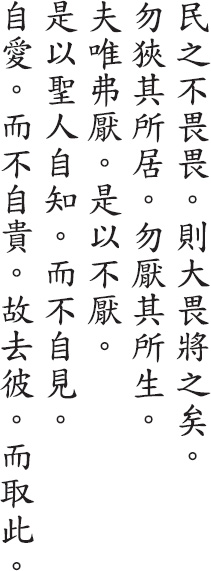72
 |
When people no longer fear authority a greater authority will appear don’t restrict where people dwell don’t repress how people live if they aren’t repressed they won’t protest sages therefore know themselves but don’t reveal themselves they love themselves but don’t exalt themselves thus they pick this over that |
WU CH’ENG says, “The authority we fear is what shortens years and takes lives. The ‘greater authority’ is our greater fear, namely death. When people no longer fear what they ought to fear, they advance their own death until the greater fear finally appears.”
WANG P’ANG says, “When people are simple and their lives are good, they fear authority. But when those above lose the Way and enact all sorts of measures to restrict the livelihood of those below, people respond with deceit and are no longer subdued by authority. When this happens, natural calamities occur and misfortunes arise.”
WANG CHEN says, “When ordinary officials and the common people have no fear, punishment occurs. When ministers and high officials have no fear, banishment occurs. When princes and kings have no fear, warfare occurs.”
WEI YUAN says, “‘Where people dwell’ refers to conditions such as wealth and poverty. ‘How people live’ refers to physical activities, such as toil and rest. When people think that their dwellings or lives are not as good as others’, they feel embarrassed and thus restricted, restricted and thus repressed. And when they feel repressed, they protest against ‘this’ and seek ‘that,’ not knowing that once their desire is fulfilled, what they fear comes close behind.”
WANG PI says, “In tranquillity and peace is where we should dwell. Humble and empty is how we should live. But when we forsake tranquillity to pursue desires and abandon humility for authority, creatures are disturbed, and people are distressed. When authority cannot restore order, and people cannot endure authority, the link between those above and those below is severed, and natural calamities occur.”
HO-SHANG KUNG says, “They know what they have and what they don’t have. They don’t display their virtue outside but keep it hidden inside. They love their body and protect their essence and breath. They don’t exalt or glorify themselves before the world. ‘That’ refers to showing and glorifying themselves. ‘This’ refers to knowing and loving themselves.”
TS’AO TAO-CH’UNG says, “‘That’ refers to external things. ‘This’ refers to one’s inner reality.”
Authority refers to a power outside us. Sages aren’t concerned with acquiring or exercising such a power. The power of sages arises naturally from the cultivation of themselves. Lao-tzu begins this verse with two puns. The force of the first pun in lines one and two is somewhat weakened in the Wangpi and other standard editions by the use of different homophones for “fear” and “authority.” In his edition of 1587, Chiao Hung noted that in ancient times these characters were interchangeable, and he suggested using one for both words. This is, in fact, what occurs in the second pun in lines five and six, where the same character is used for “repress” and “protest.” The Mawangtui texts, it turns out, agree with Chiao Hung, and I have amended lines one and two accordingly. In lines three and four, I have also turned to the Mawangtui texts for the negative injunction wu (don’t). Other editions have wu (has not) or pu (does not), both of which result in problems regarding the referent and thus in different interpretations of the entire verse. The last line also occurs at the end of verses 12 and 38. This verse is not present in the Kuotien texts.